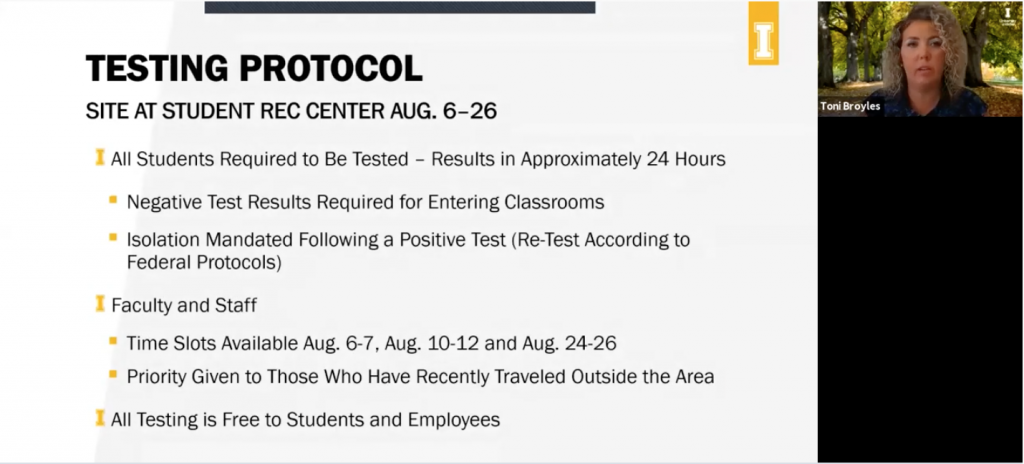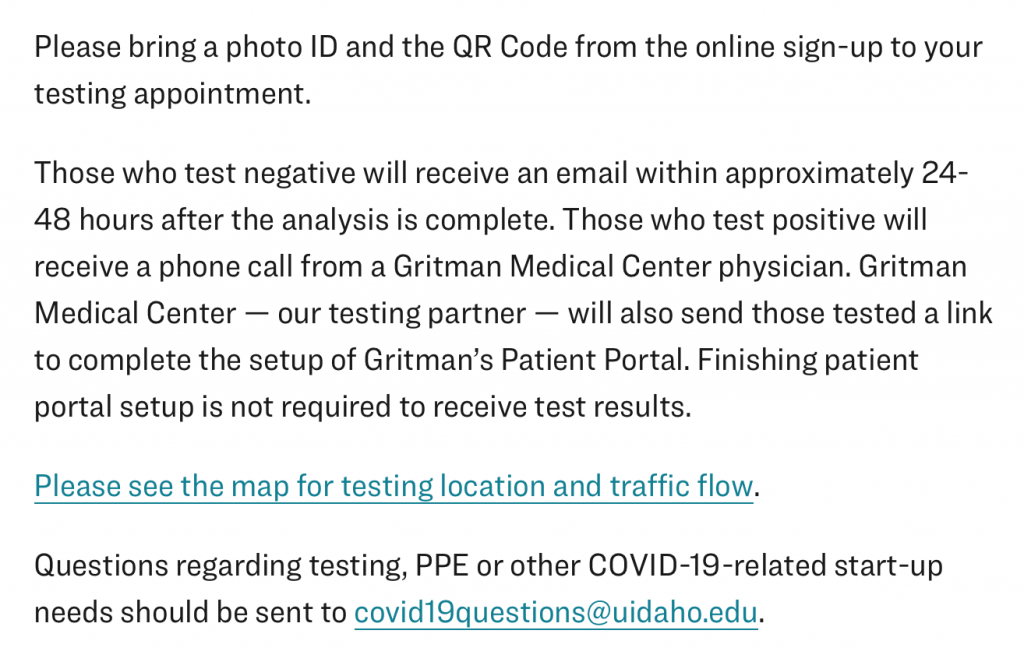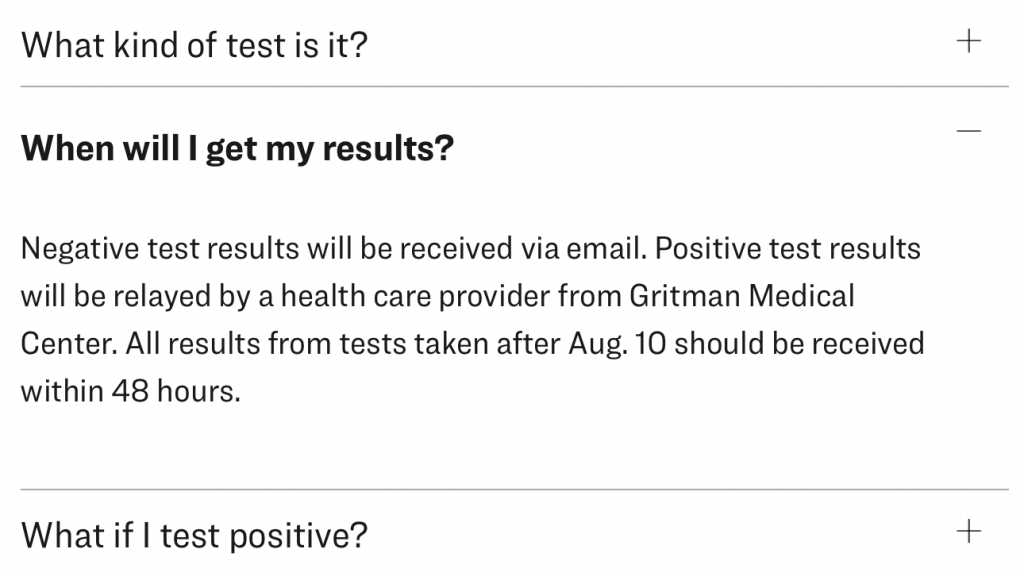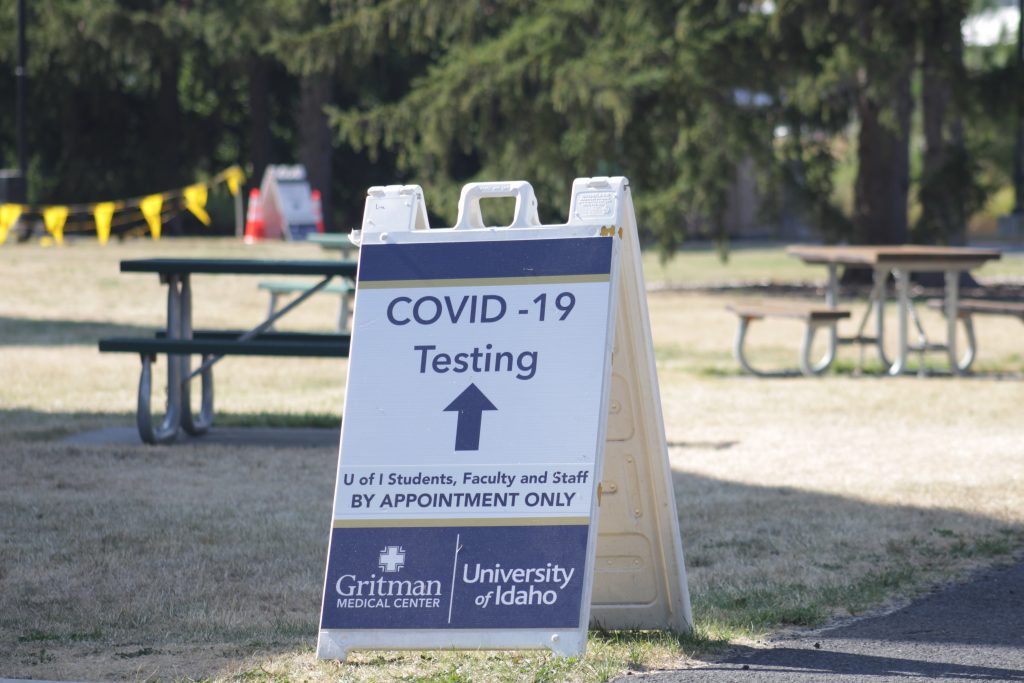On Aug. 4, University of Idaho President Scott Green assured faculty and staff that swabs taken from the school’s testing site would deliver results in approximately 24 hours. But the UI-based analysis lab is still not up and running – and results are taking far longer to be delivered.
As part of the university’s promise to reopen campus for in-person learning this fall, all students living on the Moscow campus or attending in-person classes are required to be tested for COVID-19.
“These tests will be free and offered on-campus with results delivered in approximately 24 hours,” Green said in the faculty and staff town hall. “Other (university) presidents are frustrated by the time it takes to get testing turned around. Having our own capability here on campus is just a true asset to our community that others don’t have.”
Located in the Student Recreation Center, UI’s testing site has been operational for over a week. This location, however, only completes the swabbing portion of the test. The university’s analysis lab, which is housed in a Gritman Medical Center facility, is not yet approved to analyze swabs from UI’s testing site, according to Special Assistant to the President Toni Broyles.

In the meantime, the lab is analyzing an extra batch of live, human samples which came from Boise and Spokane and are already confirmed to be COVID-19 positive. According to Broyles, it’s a triple sanity check.
“The lab’s operational, it’s just not approved to do the analysis on our UI samples,” Broyles said. “It’s like when you build a house and a contractor goes in and builds everything, but you still have to wait for the inspector to come make sure you did it right. Some inspectors go ‘yeah it looks good,’ and other inspectors are like, ‘you need to make sure everything’s not off by one 100th of an inch.'”
As of Aug. 12, the lab had two steps left before it would be Clinical Laboratory Improvement Amendments certified, according to UI COVID-19 Response Manager Seth Vieux. CLIA certification is a program which regulates all laboratory testing performed on humans in the U.S., according to the Centers for Medicare and Medicaid Services.
Until the UI lab is certified, LabCorp labs are handling the analysis of tests. It takes LabCorp three to five days to report results from COVID-19 tests, Vieux said.
But on Aug. 12, Broyles said the lab was already CLIA certified.
“We passed CLIA certification and all those checkmarks last week,” Broyles said. “Now, we’re waiting on the final approval. We’re waiting on paperwork to get up and running.”
Broyles also said the lab was certified during a faculty and staff town hall Aug. 4.
“It is our team that will be doing the analysis and it’s our equipment,” Broyles said. “It is in the Gritman lab. It is CLIA certified.”

Director of Community Relations and Marketing at Gritman Medical Center Peter Mundt declined to comment on the lab’s CLIA certification, instead directing inquiries to UI administrators.
July 30 reporting from The Argonaut, The Moscow-Pullman Daily News and KREM 2 NEWS all stated UI intended to provide results from tests within 24 hours of collecting samples. In addition, Green, Interim Provost and Executive Vice President Torrey Lawrence and other administrators repeatedly said results from UI tests would be available in the same timeframe.
A student swabbed at UI’s testing site Tuesday, Natalie Wiley, said she still hasn’t received her test results after four days. Nor did she receive instructions at the SRC regarding when she would receive results or whether she should quarantine in the meantime.
“They just had me take my test and they didn’t say anything to me; They said absolutely nothing,” Wiley said. “A lot of my other friends got tested last Thursday and only one of them has gotten something back, but the others haven’t and they’re kind of confused as to why.”
UI Director of Communications Jodi Walker said students are given information as they leave the testing site.
“I’ve talked with Seth Vieux, who is our COVID-19 project manager, and he said when he is down there on site, he is absolutely giving people information as they leave,” Walker said. “We just hope everyone will be patient with each other as we wait for those test results to come back.”
Jaxon Jones, a UI student, had his swab taken on Tuesday. He was not told the results would take several days.
“They didn’t tell me about the waiting period,” Jones said. “I’ve heard that it’s like two days.”
While no one at the testing site advised him to quarantine as he waits for the test results, Jaxon said he would likely do so anyway.
In an email to faculty, staff and students Aug. 11, Broyles said the university had already expressed early tests would be processed by a private lab while the UI analysis lab was getting approved.
“We conveyed our own analysis lab would not quite be ready by the time swabbing began,” Broyles said. “By separating the two processes, we were able to focus on perfecting the swabbing collection process before the volume of testing increases.”
However, in an email sent to students, faculty and staff Aug. 4, titled “Schedule Your Time Slot Now,” Green did not mention the university would send swabs to an external lab, nor did he say the processes of swabbing and analyzing would be separated.
“Those who test negative will receive an email within approximately 24-48 hours after the analysis is complete,” Green said. “Those who test positive will receive a phone call from a Gritman Medical Center physician.”
This sentiment was echoed by Broyles during a faculty and staff town hall the same day.
“In parallel to (swabbing), our lab is getting up and running,” Broyles said. “Our lab is ready to go for those swabs. We’re frontloading those swabs so we’re not waiting on them over the weekend as we’re ready to go.”
By Aug. 12, a day after Green sent an email explaining early tests were being processed by a private lab, this statement had changed.
“I announced at the town hall that we were starting swabbing ahead of having our lab ready,” Broyles said. “We did that on purpose, because if we have the lab operational, but no swabs, then we’re waiting on the swabbing to do the analysis.”


Hailee Malett, a student at UI, said it was her understanding the test results would be returned within two days. Malett said she was swabbed at UI’s testing site Aug. 6, the first day it opened to students, and was given no information regarding when she would receive results. She received her results Aug. 10, after four days.
“It totally makes sense they had to send them somewhere else, but they advertised 24-48 hours and everybody who got tested on Thursday got them late,” Malett said.
Faculty and staff members volunteered to participate in a test run of the university’s COVID-19 swabbing process July 29, eight days before testing opened to students. Roughly 100 people were tested July 29, according to Vice President for Information Technology and Chief Information Officer Daniel Ewart.
In an email following the test run, Ewart said results were expected to be available within a week. After a week had passed, Ewart emailed participants again to thank them for helping get the system up and running. He also informed them of the lab delay.
“You received a real test, and you will get your results,” Ewart said. “In checking with multiple labs, they would not be able to process our first 100 samples faster than the standard 5-10 days, so we will make them our first ones through our own lab, so you will get your results as soon as the lab is operational, which is any day now.”
Former UI staff member Lisa Latronica, who participated in the test run, had not received her results nearly two and a half weeks after being swabbed. Latronica said it was her impression they would receive the test results within a couple of days.
“I got tested on Wednesday, so I was looking to get test results Friday or Monday,” Latronica said. “I was expecting like 40 to 72 business hours, which is pretty standard testing turnaround from my understanding. Then we got the email that said, ‘expect 5-10 days,’ which seems like a long time to me. But 10 days came and went and I haven’t heard anything since.”
While the university originally intended to analyze volunteers’ swabs in its own lab, according to Broyles, one week passed after the test run Latronica participated in and it was still not operational. UI reversed course, finally deciding to send the swabs to a private lab after holding them for eight days.
“I didn’t make a promise to the volunteers of any kind of turnaround time,” Broyles said. “Once I saw the lab might take longer, we immediately sent them off to the private lab. I want to be clear, those swabs were not sent off on the day they were swabbed. Those were sent off Aug. 6.”
At the time she was swabbed, Latronica said she was under the impression it would be tested in UI’s lab. It’s been 17 days since the volunteers were swabbed and none of the participants have received results, according to Latronica.
She expressed concern over the usefulness of the tests after such a delay.
“From one standpoint, I definitely understand that things come up and plans don’t always go how we want them to,” Latronica said. “But I wish that had been communicated, because we haven’t received any communication. More than anything, I’m frustrated at the lack of transparency.”

Had she known it would take far longer to recieve results, Latronica would still have volunteered in the test run.
“I think it’s important to help figure this out,” Latronica said. “This is the first time the university is doing anything like this and I’m a big believer in playing your part to help figure out these new processes. But I do wish the expectations were made clearer.”
At Gritman Medical Center, which is partnering with UI, those who want to be tested need a physician’s order. At other local testing sites, individuals who wish to be tested must either display COVID-19 symptoms or have had close contact with a person known to be positive.
The Centers for Disease Control and Prevention recommends individuals also speak with their health care providers before being tested for COVID-19. However, students and employees tested for COVID-19 at the SRC are not required to speak with a doctor beforehand.
Because the tests UI sends to the private lab are not on a doctor’s order, the tests are precautionary, Walker said. UI hopes to get quicker turnarounds with its own lab.
“Not all labs will take our swabs and test them, at least as a priority,” Walker said. “We’re not testing people with the notion that all of these tests are going to come back positive. Some don’t have symptoms, they’re asymptomatic or testing for a different reason.”
As of Aug. 12, Broyles did not have an exact date for when UI’s lab would begin analyzing tests. On the same day, Vieux said he was confident the lab would be certified by Aug. 17.
“There’s paperwork that has to be approved by somebody that’s not us, and we don’t control them,” Broyles said. “I would love it if they would approve it tomorrow, but I can’t know they’ll do that.”
Walker said the lab may be up and running as soon as this weekend.
“The latest update I heard was it should be going by the end of the week,” Walker said. “But some things are beyond our control.”
By Aug. 14, the university reported 2,371 completed tests, with 34 of those being positive. On Wednesday, roughly 870 test results had been returned, according to recent reporting from The Moscow-Pullman Daily News.
This story was updated with additional information about the CLIA certification process.
Angela Palermo can be reached at [email protected] or on Twitter @apalermotweets

Christian
You know what IS in your control?? Making this semester ONLINE ONLY. I understand UI is under a lot of financial pressure (not unique by the way) but OUR LIVES ARE MORE IMPORTANT THAN MONEY. There’s going to be an out brake. Schools going to shut down. People are going to lose jobs. This isn’t just isolated to the school too. This whole town is counting on Scott Greed does the right thing.
Dan J Schmidt
excellent reporting. A follow up: Who pays for this testing? How much is it costing the University budget, if that is who pays. Do students/ faculty get billed?
Jordan
For the record, I got tested on Tuesday the 11th and got my results 5 days later on Sunday the 16th, they told me it would be 3-5 days and it was, the results said they were tested in a lab in Phoenix AZ.
Susan Ross
This is the best reporting on the complete SNAFU and many broken promises by Pres. Green and the entire UI team. They made claims and assertions of extremely good protocols to assure the safety of students, faculty, staff and community and now they have brought thousands of students here from all over the place and many aren't even being told to quarantine. It is a massive crisis in the making, and I and many others will hold Pres. Green accountable. SHAME on him.
Greg Meyer
Great story Angela. The most informative I have seen on this. The Argonaut is the source keeping us informed.